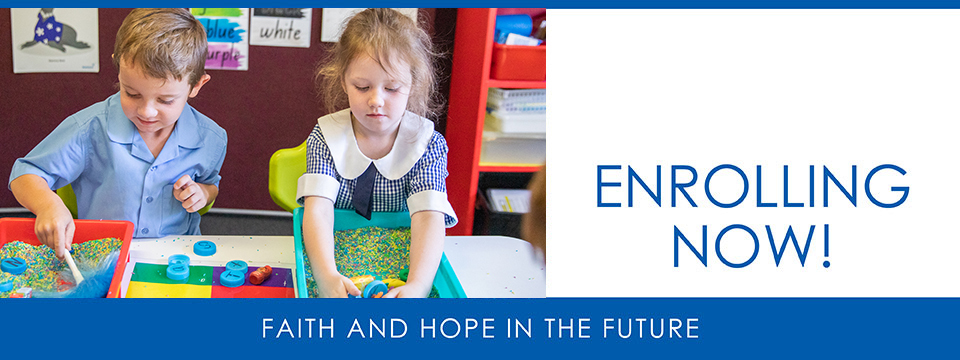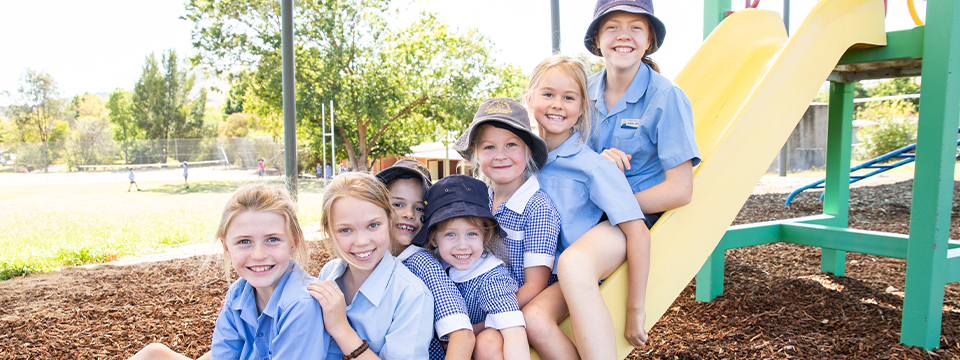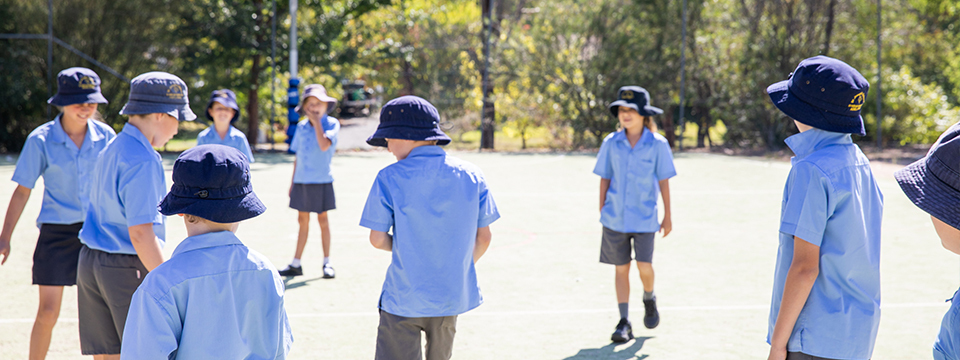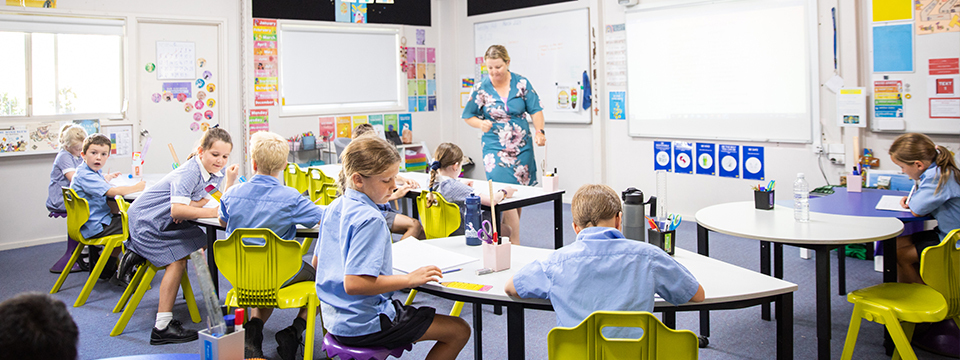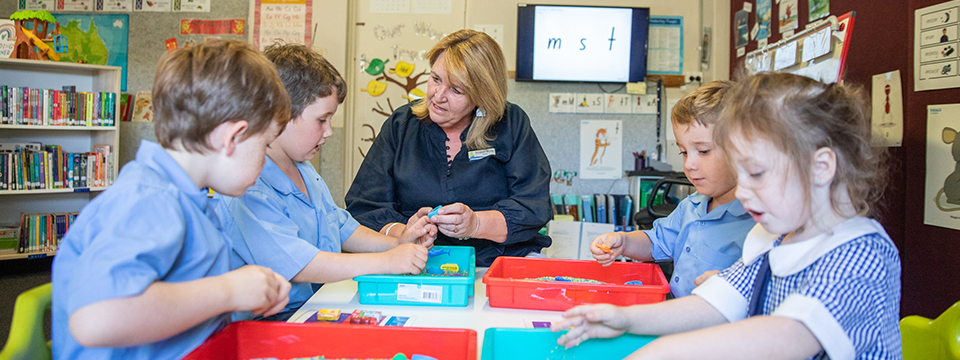Curriculum
Mathematics
The Mathematics policy is not due to be reviewed until 2007 in the cyclical curricula review followed by St. Joseph's. However, there have been a number of significant changes in the curriculum, and the teaching strategies of Mathematics in the past few years.
These are noted below and will be included in the next Mathematics policy review.
The new Revised Mathematics K-6 Syllabus issued by the Board of Studies in 2002 is organised into six strands …one process strand Working Mathematically, and five content strands, Number, Patterns and Algebra, chance and Data, Measurement and Space and Geometry. The outcomes and indicators from these strands form the teaching and learning of Mathematics at St. Joseph's.
The other major change to the teaching and learning of Mathematics at St. Joseph's has been the inclusion of 'Count Me in Too' and 'Count me into Measurement'. Both these programmes were part of professional staff development projects in 2002 and 2003. There has been ongoing Sena testing. Also, a large number of resources were purchased and made to enhance the 'hands on' approach. This has shown good results in student understanding in numeration, number and measurement concepts.
Click here for the Mathematics Policy
Religious Education
At St. Joseph's school Religious Education is seen not merely as a subject that is taught but is viewed as a way of life.
At St. Joseph's we endeavour to nurture the dignity of the individual within a diverse social, cultural and rural environment. The central mission is one of evangelisation and for many children school is the only Church they know. We see an important partnership between students, parents and teachers in the particular challenges that face St. Joseph's as a growing faith community.
The Religious Education curriculum complements the teachings of the Catholic Church and highlights the dignity of each individual as they continue on their faith journey as a member of a Christian community.
Religious Education at St. Joseph's is based on the Canberra/Goulburn Archdiocesan guidelines 'Treasures New and Old.' This syllabus focuses on the parish, the school and home as working in active partnership to support the children in their faith development.
The Eucharistic community, the educating community and the "domestic faith community" are all partners in faith development.
'..be of the same mind, having the same love, being in full accord and of one mind.' Philippians 2:2
Enrichment
HSIE Special Programs
A number of special programs run at St. Joseph's in the area of Human Society and Its Environment.
In all Stages St. Joseph's has …
Assemblies and Guest Speakers
Assemblies are the opportunities for student display of H.S.I.E. projects.
This is also an opportunity for a diverse range of guest speakers, correlated where possible to focus on the H.S.I.E. unit being studied, e.g. Aboriginal guest speakers came to speak as part of the Aboriginal Studies unit.
Excursions
The students have made a number of excursions. Local day excursions support and enhance units of work, these are made around Adelong and Tumut and include Museum visits and local shops.
Students visit Canberra on a day excursion with K,1,2 experiencing a live theatre show and upper primary visiting a place of interest which relates to work that is being studied at that time.
Visits to school at Brungle (special displays of Aboriginal artefacts) and visit to the local Aboriginal Art Exhibition are part of the unit on Aboriginal Studies.
Science
At St. Joseph's school, Science and Technology is seen not merely as a subject that is taught, but as a way of developing an awareness of the importance of a fulfilled life. As in all other Key Learning Areas taught at St. Joseph's, Science and Technology has a religious dimension. 'The various school subjects do not present only knowledge to be attained, but also values to be acquired and truths to be discovered.' (The Catholic School, p.39) from Treasures New and Old p.25.
At St. Joseph's we aim to develop a positive attitude towards Science and Technology, to support and enhance a fulfilling lifestyle. Encouragement is also given to individuals to explore and develop their skills in challenging and interesting units. The aim of the Science and Technology curriculum is to develop good understanding of units studied, an increasing level of skills in research and an appreciation of the values of this curriculum area.
Click here for the Science Policy
Human Society and Its' Environment
At St. Joseph's school, Human Society and Its Environment is seen not merely as a subject that is taught, but as a way of developing an awareness of the importance of a fulfilled life. As in all other Key Learning Areas taught at St. Joseph's, the Human Society and Its Environment has a religious dimension. 'The various school subjects do not present only knowledge to be attained, but also values to be acquired and truths to be discovered.' (The Catholic School, p.39) from Treasures New and Old p.25.
At St. Joseph's we aim to develop a positive attitude towards Human Society and Its Environment, to support and enhance a fulfilling lifestyle. Encouragement is also given to individuals to explore and develop their skills in challenging and interesting units. The aim of the Human Society and Its Environment curriculum is to develop good understanding of units studied, an increasing level of skills in research and an appreciation of the values of this curriculum area.
Click here for the HSIE Policy
Physical Health and Personal Development
At St. Joseph's School, Personal Development, Health and Physical Education is seen not merely as a subject that is taught, but as a way of developing an awareness of the importance of a healthy lifestyle.
As in all other Key Learning Areas taught at St. Joseph's, PD/H/PE has a religious dimension.
'The various school subjects do not present only knowledge to be attained, but also values to be acquired and truths to be discovered.' (The Catholic School, n.39) from Treasurers New and Old p.25. At St. Joseph's, we encourage individuals to adopt a healthy lifestyle for themselves, and to develop a responsibility to inform others of the positives associated with health living.
The aim of our PD/H/PE curriculum is to develop well informed individuals on issues such as improved health practices, positive relationships, informed decision making, quality of life, the value of physical activity, less sickness and disability and a positive attitude towards a healthy lifestyle.

